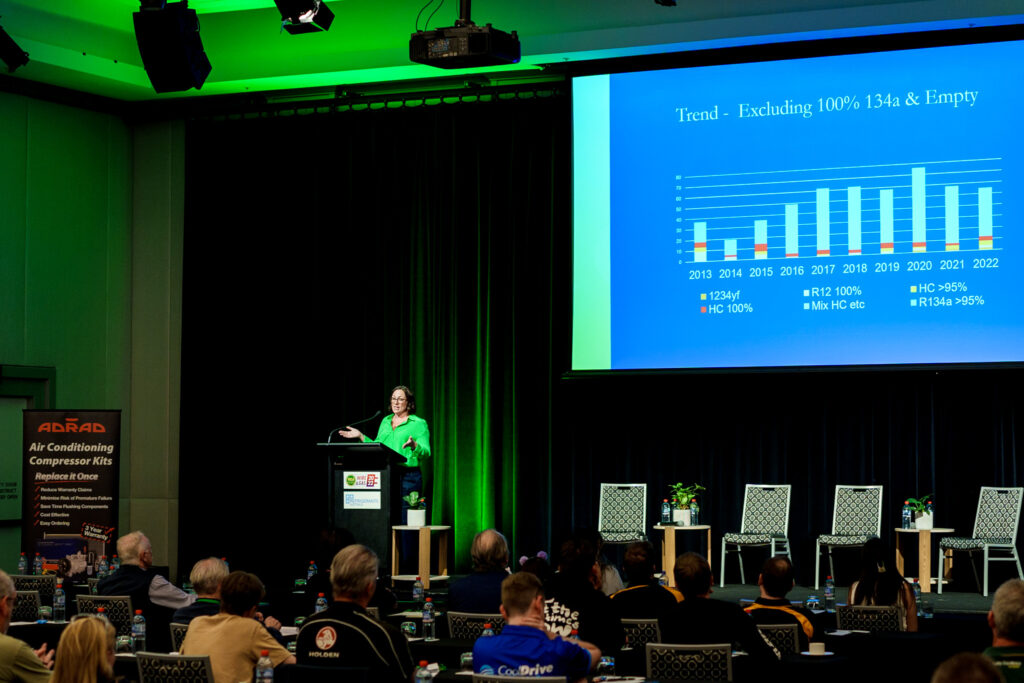Slow YF uptake and poor refrigerant recovery rates are cause for concern
- PostedPublished 7 November 2022
An indictment on the slow uptake of R1234yf in vehicles exported to Australia is that the same number of cars were found to have a full charge of R12 – banned since the mid-1990s – as were running YF in the latest annual mobile air-conditioning survey report produced by Refrigerant Reclaim Australia (RRA).

Produced using data collected from participating VASA workshops and presented by RRA general manager Kylie Farrelley at Wire & Gas 2022, the results made the reticence of car manufacturers to send cars with YF here even more concerning due to a sharp increase in the number of vehicles presented with zero refrigerant charge since the start of the COVID-19 pandemic.
“In this particular survey, this year, we had the same amount of vehicles across Australia containing 100 per cent R12, as we did containing R1234yf,” Kylie told attendees.

“You can make some assumptions on the increased frequency of vehicles that had no refrigerant charge in them,” she said.
“Perhaps people were not driving the cars as often [due to lockdowns and working from home] and seals dried out, or they lost employment [due to the pandemic] so they didn’t have the money to repair their vehicles and things like that.”

If more of these cars had come from the factory with ultra-low global warming potential refrigerant R1234yf, that escaped gas would have caused far less environmental harm.
But there’s more. RRA is pushing to find out why a disproportionately small amount of refrigerant is returned from the automotive sector for safe destruction.

The assumption is that much of it simply escapes to do harm in the atmosphere, in which case, again, the slow uptake of YF has likely caused preventable harm.
“In the mobile air conditioning space only five per cent of all refrigerant sold is recovered,” said Kylie, adding that by comparison the stationary sector recovers 17 per cent of all refrigerant sold.

She said among the valid reasons for this discrepancy could be that the smash repair sector buys refrigerant to recommission systems but is not often involved in the recovery of refrigerant as it is often lost in a collision by the time they see the vehicle.
However, Kylie cited several reasons for lower recovery rates in automotive – aside from components being vulnerable to front-end collisions – including human and business factors such as “poor recovery from wreckers, insurance companies and panel beaters, that kind of thing”.

RRA is working to address this issue. “We’re starting to work with different organisations speaking to different people about how we can improve recovery rates from end-of-life vehicles,” Kylie said.
“We’re doing that through reaching out to panel beaters directly, wreckers directly, and insurance companies … We’ve had one local council that happens to work with vehicle air-conditioners that have signed up as a collection agent for us.”

However, getting more refrigerant from end-of-life vehicles is going to require a concerted and coordinated effort.
“VASA, Refrigerants Australia, RRA and many other organisations, for years, have been trying to get better buy-in from this end-of-life vehicles sector and we’ve had limited success for a number of reasons. But doesn’t mean it was a bad idea,” said Kylie.

“The time is right to try what may not have worked in the past. I think people have got more of an appetite to do the right thing, there’s more pressure on them to do the right thing. And there are certainly some things going on in this space, positive signs that things are going in the right direction.”
For example, the Federal Chamber of Automotive Industries (FCAI) and Motor Trades Associations of Australia (MTAA) have financial support from the federal government to set up an end-of-life vehicle stewardship program.

“This is something that I am particularly excited about and I’d like to like to see what we can do to assist them in that in that in that in that space,” said Kylie.
“With the change in government, there’s a change in appetite to do more in that space, too … There are things happening in the space and I think it’s a really good time to get active.”



